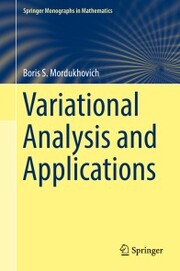Detailansicht
Variational Analysis and Applications
eBook - Springer Monographs in Mathematics
ISBN/EAN: 9783319927756
Umbreit-Nr.: 5408425
Sprache:
Englisch
Umfang: 0 S., 11.06 MB
Format in cm:
Einband:
Keine Angabe
Erschienen am 02.08.2018
Auflage: 1/2018
E-Book
Format: PDF
DRM: Digitales Wasserzeichen
- Zusatztext
- <p>Building on fundamental results in variational analysis, this monograph presents new and recent developments in the field as well as selected applications. Accessible to a broad spectrum of potential readers, the main material is presented in finite-dimensional spaces. Infinite-dimensional developments are discussed at the end of each chapter with comprehensive commentaries which emphasize the essence of major results, track the genesis of ideas, provide historical comments, and illuminate challenging open questions and directions for future research.</p><p>The first half of the book (Chapters 16) gives a systematic exposition of key concepts and facts, containing basic material as well as some recent and new developments. These first chapters are particularly accessible to masters/doctoral students taking courses in modern optimization, variational analysis, applied analysis, variational inequalities, and variational methods. The readers development of skills will be facilitated as they work through each, or a portion of, the multitude of exercises of varying levels. Additionally, the reader may find hints and references to more difficult exercises and are encouraged to receive further inspiration from the gems in chapter commentaries. Chapters 710 focus on recent results and applications of variational analysis to advanced problems in modern optimization theory, including its hierarchical and multiobjective aspects, as well as microeconomics, and related areas. It will be of great use to researchers and professionals in applied and behavioral sciences and engineering.</p><p></p>
- Kurztext
- Building on fundamental results in variational analysis, this monograph presents new and recent developments in the field as well as selected applications. Accessible to a broad spectrum of potential readers, the main material is presented in finite-dimensional spaces. Infinite-dimensional developments are discussed at the end of each chapter with comprehensive commentaries which emphasize the essence of major results, track the genesis of ideas, provide historical comments, and illuminate challenging open questions and directions for future research.The first half of the book (Chapters 1-6) gives a systematic exposition of key concepts and facts, containing basic material as well as some recent and new developments. These first chapters are particularly accessible to masters/doctoral students taking courses in modern optimization, variational analysis, applied analysis, variational inequalities, and variational methods. The reader's development of skills will be facilitated as they work through each, or a portion of, the multitude of exercises of varying levels. Additionally, the reader may find hints and references to more difficult exercises and are encouraged to receive further inspiration from the gems in chapter commentaries. Chapters 7-10 focus on recent results and applications of variational analysis to advanced problems in modern optimization theory, including its hierarchical and multiobjective aspects, as well as microeconomics, and related areas. It will be of great use to researchers and professionals in applied and behavioral sciences and engineering.
- Autorenportrait
- <b>Boris S. Mordukhovich</b> is a Distinguished University Professor of Mathematics at Wayne State University. His areas of research include optimization and variational analysis, control theory, nonlinear systems, generalized differentiation, and various applications. Professor Mordukhovich has authored more than 400 publications including two volumes in Springers Grundlehren series entitled Variational Analysis and Generalized Differentiation. He is a Fellow of the American Mathematical Society (AMS) and the Society of Industrial and Applied Mathematics (SIAM).
